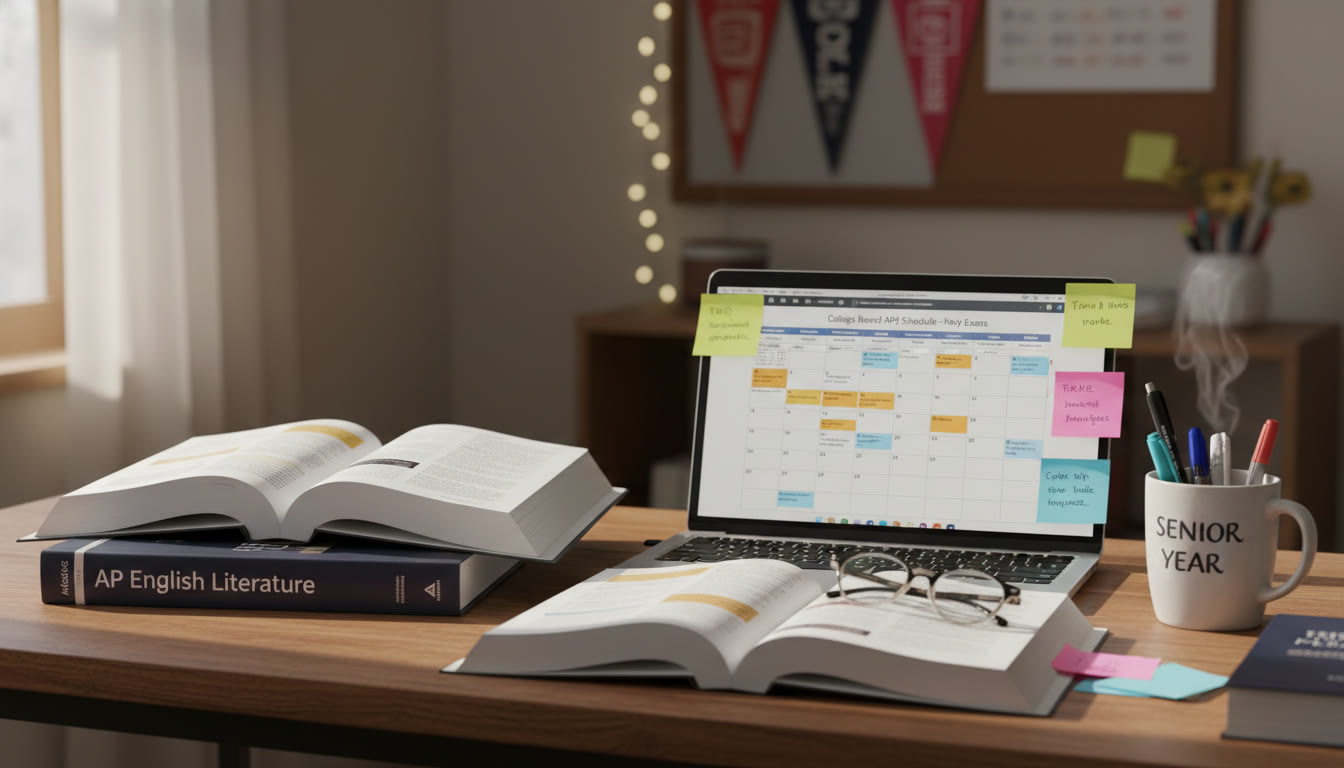Why This Year Matters (And How You Can Make the Last Months Count)
Senior year is a strange blend of celebration and crunch. College applications, prom photos, and final essays sit alongside the very real pressure of Advanced Placement exams. For many 12th graders, AP exams are a last big academic push that can affect college credit, placement, and — just as importantly — confidence.
This roadmap is a calm, realistic guide to the rest of your AP year. It’s written for students who want practical steps, emotional checks, and a little tactical wisdom: how to schedule remaining study time, what to polish in the final months, and how to walk into your exams feeling prepared — not panicked. Where it fits naturally, you’ll see how Sparkl’s personalized tutoring (one-on-one guidance, tailored study plans, expert tutors, and AI-driven insights) can plug gaps and give your plan a serious boost.

Key Dates and Deadlines You Need on Your Radar
Most AP exams happen in a two-week window in May. These are essential anchors for your schedule — they tell you when to peak and when to taper. Also watch for digital portfolio deadlines and school-specific ordering or registration cutoffs.
- AP Exam Administration: Early May (two-week window). Use the exact dates your school or AP coordinator distributes and mark them in your calendar now.
- Portfolio and Performance Task Deadlines: If you’re in AP Seminar, AP Research, AP Art and Design, or AP Computer Science Principles, confirm digital submission deadlines and internal teacher deadlines as these are often earlier than the College Board’s final cutoff.
- Score and Score-Reporting Windows: AP scores are typically released in July. Note score-send deadlines if you plan to send scores to colleges.
Having these checkpoints in your calendar helps you plan backward from the exam date so your final weeks are strategic, not frantic.
Three-Phase Plan: Review, Refine, and Rock the Exam
Think of the rest of the year in three phases. Each phase has a clear focus so you know exactly what to do and when.
Phase 1 — Review (Now through 8–10 weeks before your exam)
This is the time to build a strong foundation: identify weak spots, consolidate notes, and get a reliable content map in place.
- Create a content inventory. List the units or topics your teacher covered and mark your confidence level for each (High | Medium | Low).
- Use past free-response questions and scoring rubrics to understand what graders look for. Practice one short response per week and self-grade honestly.
- Set a weekly rhythm: 3–5 focused study sessions of 45–75 minutes rather than marathon sessions. Active recall beats passive rereading.
- Consider short, targeted help. A 1-on-1 Sparkl tutoring session can quickly diagnose misconceptions and give a focused study plan tailored to your timeline.
Phase 2 — Refine (8–3 weeks before exam)
Now you’re tightening skill gaps: timed practice, question patterns, and strategy work for multiple-choice and free-response sections.
- Begin timed practice: half of your practice sessions should mimic testing conditions for full sections.
- Review exam-specific strategies: time allocation, data-interpretation shortcuts, and how to structure responses under rubric constraints.
- Make a short cheat-sheet (study sheet) with essential formulas, key dates, vocabulary, or historical timelines — not to bring into the exam, but to drill memory consolidation.
- Refine your exam-day routine: what you eat, sleep schedule, travel time to your test site, and what materials to bring (photo ID, pens, approved calculator if needed).
Phase 3 — Rock (Last 2–3 weeks, including the week before your exam)
This is peak week planning: smart tapering, confidence-building, and logistics. The aim is to be sharp — not exhausted.
- Switch to lighter, high-quality practice: one timed practice a week, daily short drills, and a focus on problem types that cost you points previously.
- Avoid cramming new heavy content in the final 48–72 hours. Instead, review your study sheet and do low-stress tasks like conceptual flashcards or quick past-question reviews.
- Run a rehearsal: simulate your entire test morning from waking up to walking into the room — this reduces surprises on the exam day.
- If anxiety spikes, short sessions with an expert tutor or counselor can help you apply breathing techniques and cognitive reframing so nerves don’t sabotage performance. Personalized support, like Sparkl’s targeted coaching, can help make that last-week push calm and effective.
Practical Weekly Study Schedule (Sample 8-Week Plan)
Below is a flexible template you can adapt depending on subjects and your current confidence. It balances content review, practice, and rest.
| Week | Main Focus | Weekly Goals | Practice Mix |
|---|---|---|---|
| Weeks 8–6 | Content Consolidation | Finish weak units, master key concepts | 50% untimed content, 50% short problems |
| Weeks 5–4 | Timed Practice | 2 full sections under time, 3 focused drills | 60% timed sections, 40% review |
| Weeks 3–2 | Free-Response Strategy | Master rubrics, practice 3–4 FRQs/week | 50% FRQ practice, 30% timed MC, 20% review |
| Week 1 | Taper and Rehearse | Light drills, sleep plan, logistics checked | 30% light practice, 70% rest and mental prep |
Study Techniques That Actually Move the Needle
Not all studying is equal. These are evidence-backed strategies that seniors swear by because they build durable knowledge fast.
- Active Recall: Test yourself without notes. Use flashcards or closed-book prompts and then check answers. This strengthens retrieval pathways.
- Spaced Repetition: Revisit topics multiple times with increasing intervals. This is the best way to make content stick long-term.
- Interleaving: Mix topics or question types in a single session. It feels harder, but it improves transfer and problem selection skills.
- Exam-Specific Simulation: Do sections under timed conditions, in the right order, with exactly the same materials you’ll use on test day.
- Rubric-Based Practice: For free-response questions, practice with the official rubric in hand and aim to score your own answers.
How to Use Practice Tests Effectively
Practice tests are more than score checks — they’re diagnostic labs. Here’s how to use them so they become growth tools.
- Score the test and record question-level performance (which topics, which question formats).
- Spend twice as much time reviewing mistakes as you did taking the test. Identify patterns: consistent algebra errors, misreading prompts, or time mismanagement.
- Convert each mistake into a micro-goal (e.g., “reduce careless arithmetic errors by rechecking work,” or “outline free responses before writing”).
- Use targeted practice sessions based on the micro-goals. If you have limited time, prioritize the mistakes that cost you the most points.
Managing Stress, Sleep, and Momentum
Performance is not just cognitive — it’s physiological. The best students treat sleep, nutrition, and stress as part of their exam toolkit.
- Sleep: Aim for consistent 7–9 hours per night. Cognitive function and memory consolidation rely on sleep more than cramming does.
- Nutrition: On test day, favor steady-energy meals: whole grains, protein, and hydration. Avoid heavy or unfamiliar foods the morning of the exam.
- Mindset: Reframe nerves as readiness. Brief breathing exercises (box breaths for two minutes) before the test can lower heart rate and improve focus.
- Micro-rewards: Celebrate small wins (a hard practice done, a concept mastered) to maintain motivation. This keeps momentum alive without burnout.
Logistics and Exam-Day Checklist
Have these items and steps sorted at least a week ahead so nothing becomes a last-minute shock.
- Confirm your exam date, start time, and testing room with your AP coordinator.
- Pack essentials: photo ID, pens/pencils, approved calculator (with fresh batteries), water, snack, admission ticket if required.
- Know the location: do a trial run if the testing location is unfamiliar. Factor in traffic, parking, and time to sign in.
- Arrive 30–45 minutes early to settle in and reduce stress. Use a short breathing routine while waiting to center yourself.
When to Get Extra Help — and How to Make It Work Fast
Extra help is not a sign of weakness — it’s an efficiency move. If you’ve tried self-study and still miss the same types of questions repeatedly, targeted support can recover weeks of progress in a few sessions.
- Use a tutor for targeted weaknesses (e.g., AP Physics kinematics, AP Calc series tests, or thesis structure in AP English). Don’t use tutors to re-teach everything you already know.
- Ask for modeled responses and think-aloud problem solving so you can copy expert thinking patterns and then practice them independently.
- One-on-one help is especially effective in the last 4–8 weeks when a tutor can run through the exact rubric expectations and provide bespoke practice tasks. Sparkl’s personalized tutoring offers that kind of one-on-one guidance and tailored study plans if you want a coach who adapts to your performance data and keeps you accountable.
Examples: Subject-Specific Quick Wins
Here are quick, practical tips for common AP subjects — small actions that produce outsized results.
- AP Calculus: Memorize the derivatives and integrals you’ll need and practice setting up integrals from graphs; focus on interpretation of results.
- AP Biology: Focus on pathways and cause-effect relationships. Draw diagrams from memory and explain a process in three sentences.
- AP U.S. History: Build concise one-paragraph thesis templates and practice connecting evidence to that thesis under timed conditions.
- AP English: Practice outlining an essay in five minutes before you write; annotate sample passages to speed evidence selection.
- AP Statistics: Practice interpretation of p-values and confidence intervals in plain language; double-check arithmetic steps under time pressure.

Common Pitfalls and How to Avoid Them
Students often make the same mistakes near exam time — here’s how to dodge them.
- Pitfall: Cramming new content the night before. Fix: Use the final 48 hours for consolidation and active recall, not heavy new lessons.
- Pitfall: Ignoring logistics. Fix: Pack the night before and do a room run-through; small hiccups cause big stress on test morning.
- Pitfall: Comparing scores with others. Fix: Use peers for support, not as a scoreboard. Focus on your trajectory and specific practice goals.
- Pitfall: Overreliance on passive review. Fix: Replace rereading with short, active tasks: flashcards, problem sets, and timed sections.
How to Monitor Progress and Adjust the Plan
Progress monitoring keeps study efficient. Use simple metrics and act quickly if they stall.
- Track accuracy and timing on practice sections weekly. If accuracy improves but timing lags, shift practice to timed drills.
- Set micro-goals each week (e.g., “increase FRQ score by 1 rubric point”). Celebrate meeting those goals and revise the plan if you don’t.
- If you see repeated errors in one area after three weeks, escalate: more focused practice, an additional tutor session, or a different resource that explains the concept differently.
Final Week Checklist: Calm, Clear, Ready
Two pages you should follow in the final week: logistics and mental prep. Keep them short and actionable.
- Confirm arrival time and materials. Print or screenshot your admission ticket if required.
- Sleep schedule: go to bed and wake up at your intended exam-day times for the whole week.
- Day-before: review high-yield notes for 60–90 minutes, then step away. Do something relaxing in the evening.
- Exam morning: eat a familiar breakfast, hydrate, arrive early, and use a 2–3 minute breathing routine before sitting down.
Parting Thought: You’re More Prepared Than You Think
AP season is a sprint and a craft — a sprint because it has deadlines, and a craft because real learning happens in deliberate repetition. Follow the plan, use practice tests as diagnostics, manage your energy, and don’t be shy about targeted help. The right tutor or study plan can save you weeks of effort and transform uncertainty into confidence — that’s where Sparkl’s tailored one-on-one guidance and AI-driven insights can be a perfect complement to your hard work.
Finish this year knowing you did everything you could to reach your potential. You’ve got the roadmap — now put on your headphones, open a clean page, and take the next step. The countdown is on, and you’re ready to finish strong.
















No Comments
Leave a comment Cancel